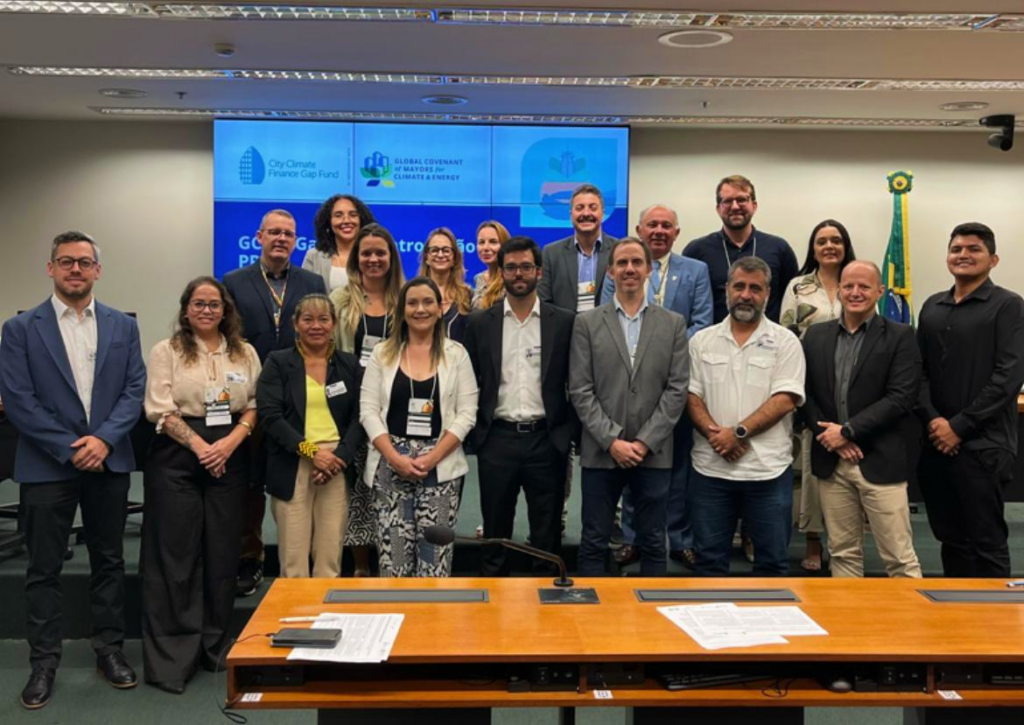
New Partnership to Strengthen State-Level Climate Action in Brazil Ahead of COP30
March 31, 2025, Brazil: The Global Covenant of Mayors for Climate and Energy (GCoM), the Green Brazil Consortium, and the Brazil Climate Center (CBC) have signed a collaboration agreement to enhance access to subnational climate finance in Brazil. Formalized during the Consortium’s assembly on March 12, the agreement aims to strengthen the capacity of Brazilian state governments to access climate finance and position tangible urban climate solutions in the lead-up to COP30.
As one of the largest economies in the Global South and the host of the upcoming COP30, Brazil demonstrates leadership in multilevel climate governance. State governments play a pivotal role in implementing climate solutions at the local level, bridging the gap between national climate commitments and the realities of cities and regions. Yet, many subnational entities face challenges in accessing climate finance, both domestic and international, and navigating project preparation processes.
This partnership focuses on strengthening capacities for climate project preparation and financing mechanisms for state-led climate action. By providing targeted training sessions and mentorship, the collaboration will equip subnational governments with tools to develop impactful climate projects, access Project Preparation Facilities (PPFs), and identify funding opportunities for sustainable urban development.
A Contribution Towards Climate Finance Readiness
The agreement builds on previous collaboration between these organizations during 2024, including a workshop held at Urban20, where State governments received first-hand insights on nature-based solutions and sustainable mobility projects from the GCoM-Gap Fund partnership team. The agreement also aligns with Brazil’s commitment to the Coalition for High Ambition Multilevel Partnerships (CHAMP) for Climate Action, reinforcing the role of subnational governments in achieving the Paris Agreement goals.
Under the agreement, participating Brazilian states—members of Green Brazil Consortium, which represents 15 states covering all six of Brazil’s national biomes—will receive direct support to:
- Develop climate investment concept notes for Project Preparation Facilities (PPFs)
- Strengthen technical capacities for state governments to design sustainable urban projects
- Reinforce coordination mechanisms with international climate finance institutions.
Shaping the Road to COP30 and Beyond
With COP30 scheduled for later this year in Belém, the agreement provides a roadmap for multilevel collaboration that will help Brazilian states prepare robust climate finance strategies. It establishes a framework for cooperation, contributing to the effective participation of state governments in international climate negotiations and financing dialogues.
Mr. Renato Casagrande, Governor of Espiritu Santo State and President of the Brazil Verde Consortium, remarks that “this partnership is a milestone in our mission to equip Brazilian states with the tools and capacity to develop impactful climate projects and unlock access to climate financing. Through the Brazil Verde Consortium, we are committed to empowering states to transform ambition into action. Climate finance will be one of the most critical topics at COP30, and states also expect broader access to climate finance”
“The leadership of Brazil to accelerate multilevel climate action is evident,” said Johanna Granados Acala, Global Head of the GCoM-Gap Fund partnership. “State governments play a key role in implementing climate solutions at the local level and act as a bridge between national commitments and the realities of cities and regions. As GCoM, we celebrate this agreement convinced that collaboration and joint action are the path to a sustainable and resilient future.”
As Brazil gears up to host COP30, this partnership showcases the country’s commitment to climate leadership. It ensures that subnational governments have the tools and resources to deliver real climate impact.